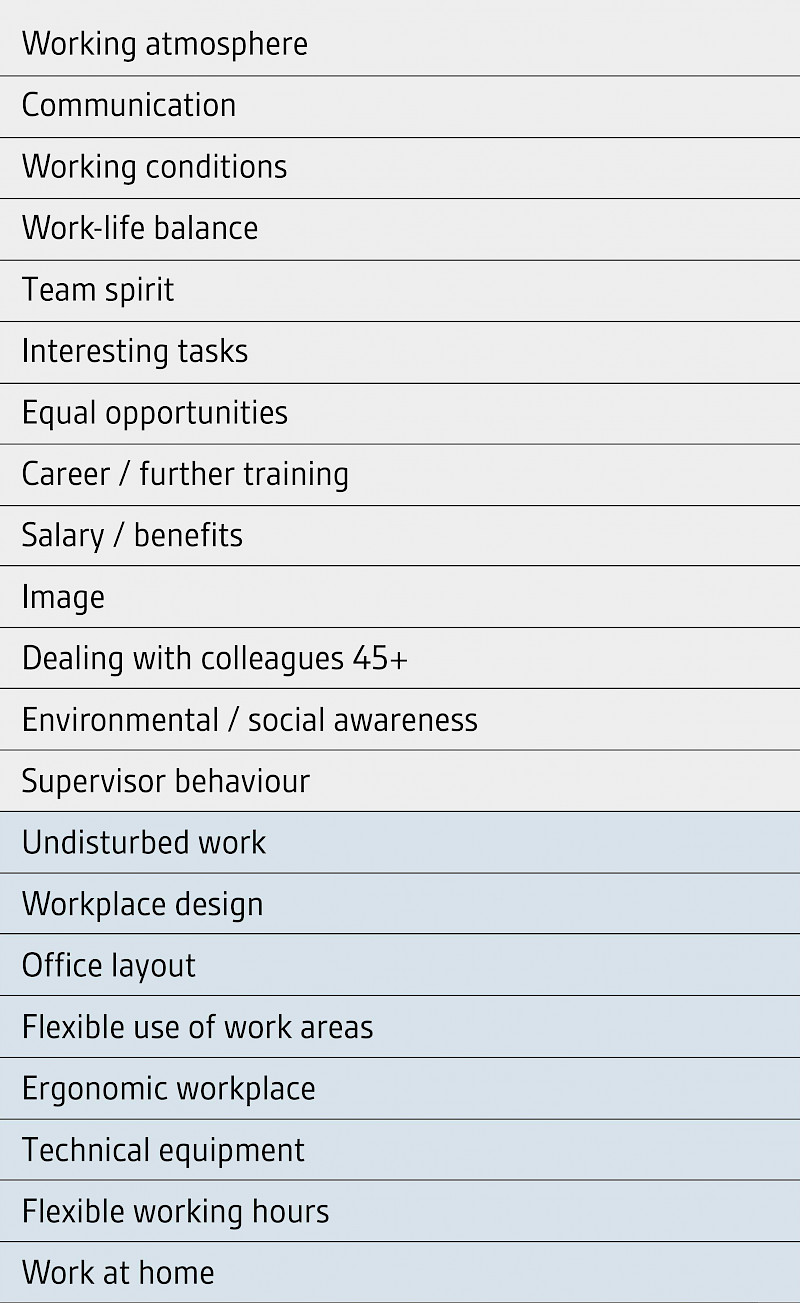Recommendations by employees are an important instrument of employer marketing. They have a high degree of credibility and have a demonstrably favourable effect on the fit between applicants and companies in the context of recruitment.
Dr Katharina Radermacher, Academic Councillor at the professorial chair for human resource management at Paderborn University, and her colleague Enja Marie Herdejürgen analyse how the individual aspects of a job affect the likelihood that employees will be willing to recommend their company as an employer in their study Das Potential von Arbeitsatmosphäre und Arbeitsplatzgestaltung für die Weiterempfehlungsbereitschaft (The potential of workplace atmosphere and workstation design to influence willingness to recommend), which was published in January 2022. For their study they analysed employees’ assessments on the employer rating platform kununu.com.
Part 1: Quantitative Analysis
First, the two researchers used a data set that was generated in connection with the Best Workplace Award 2019.
The award, which is sponsored by kununu and the IBA, is granted to companies whose employees express an above-average degree of overall satisfaction with their work situation and which also stand out because of an especially attractive work environment. In order to collect the data, the standardized assessment criteria at kununu.com were supplemented with additional workplace-related characteristics, for a limited period of time in each case. A total of 13,033 assessments were made between March and May 2019, and these were incorporated into the study. At 57%, large companies with more than 250 employees were overrepresented in these assessments. 26% of the assessments that were submitted dealt with medium-sized companies, and 17% dealt with companies with less than 50 employees. The collection of employer and workplace attributes used a five-tier scale for each of these categories, and the respondent’s willingness to recommend the company as an employer was queried as a yes/no criterion.
The results of the analysis were very clear-cut. The strongest influence by far on the employees’ willingness to recommend their company as an employer was the working atmosphere.
Other “soft” criteria, such as the managers’ behaviour and the quality of internal communication, support the employees’ readiness to personally recommend an employer. By comparison, salaries and the work-life balance have a significantly smaller influence on employees’ readiness to recommend an employer.
Among the workplace-related attributes, it was primarily the aspects of self-determined working (“flexible working time” and “flexible use of work areas”) that had a positive effect on the percentage of recommendations. In combination, their influence is just as strong as that of managers’ behaviour. Employers also received positive ratings if there was a significant connection between the employees’ opportunities to use different work areas flexibly and the quality of the internal communication that they experienced.

grey = standard kununu survey,
blue = additional workplace design factors
Part 2: Qualitative analysis
In order to make these findings useful for the work of human resources departments, in the second part of the study Radermacher and Herdejürgen addressed the question of how to create a positive workplace atmosphere. To this end, they used the fact that on the kununu.com platform employees are asked to explain their ratings by entering a short text. The two researchers drew a random sample of 1,788 texts from the 44,000 comments on the topic of workplace atmosphere that were submitted in 2019, and they then subjected this sample to a precise analysis.
The result: Human resources departments that want to improve the working atmosphere in their companies should prioritize strengthening the employees’ sense of solidarity. Above all, they should avoid subjecting the employees to excessive physical and emotional stress.
According to the comments analysed, aspects of office design (attractive office design, suitable equipment), modern work organization (flexibility, autonomy, flat hierarchies) and the corporate culture also have a positive influence on employees’ perception of the working atmosphere. However, this influence is much less extensive than that of the influencing factors named above. Nonetheless, in their study Radermacher and Herdejürgen point out that it is clearly worthwhile for a company to invest in workstation design in order to strengthen its own employees’ willingness to recommend it as an employer. For one thing, today companies need to exploit all of the existing potential during their recruiting process. For another, factors such as an open office design with many flexibly usable meeting points have a positive influence on the employees’ sense of solidarity within a company. This has an indirect effect on the working atmosphere and on the employees’ willingness to recommend their company as an employer.
INFORMATION ON THE STUDY
The results of the study were published in condensed form by the IBA. A printed version can be ordered free of charge at https://iba.online/knowledge/en/service/magazines/.
_____
The cover photo of this article: iStock by Getty Images, oatawa




